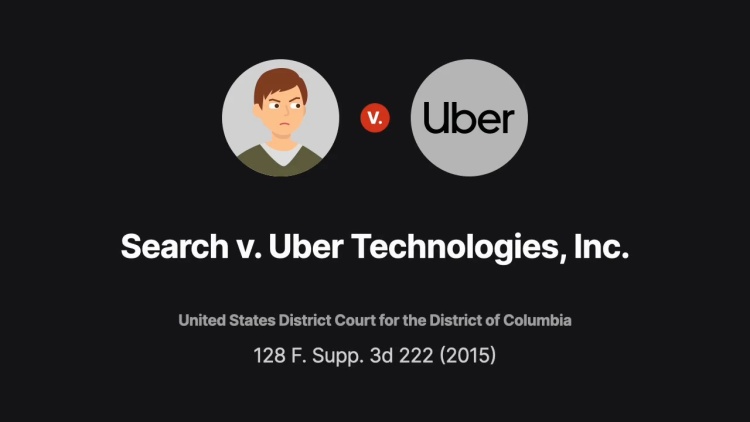Search v. Uber Technologies, Inc.
United States District Court for the District of Columbia
128 F. Supp. 3d 222 (2015)
- Written by Liz Nakamura, JD
Facts
Erik Search (plaintiff) used Uber Technologies, Inc.’s (Uber) (defendant) ride-hailing mobile app to summon a driver. The driver who responded, Yohannes Deresse, attacked Search with a knife. Search filed a negligence action against Uber arguing that Uber was vicariously liable for Deresse’s actions because either (1) Uber was in an employer-employee relationship with Deresse or (2) Uber was liable under the theory of vicarious liability by ostensible agency because Uber represented to customers, including Search, that Uber’s drivers were Uber’s agents. Search presented evidence that Uber’s mobile app and website stated that Uber’s services could be used to summon a private driver who was rigorously screened and monitored by Uber. Uber moved to dismiss, arguing that (a) Deresse was an independent contractor, not an employee, and (b) Uber was not vicariously liable for Deresse’s conduct because Uber’s user agreement contained an explicit exculpatory clause stating that Deresse was not Uber’s agent.
Rule of Law
Issue
Holding and Reasoning (Boasberg, J.)
What to do next…
Here's why 907,000 law students have relied on our case briefs:
- Written by law professors and practitioners, not other law students. 47,100 briefs, keyed to 996 casebooks. Top-notch customer support.
- The right amount of information, includes the facts, issues, rule of law, holding and reasoning, and any concurrences and dissents.
- Access in your classes, works on your mobile and tablet. Massive library of related video lessons and high quality multiple-choice questions.
- Easy to use, uniform format for every case brief. Written in plain English, not in legalese. Our briefs summarize and simplify; they don’t just repeat the court’s language.







